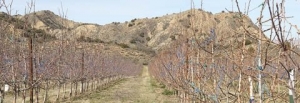
Cuyama Valley, an isolated narrow valley about 20 miles long, is halfway between Santa Maria and Bakersfield, which are each about 70 miles away. Wildlife, like bears, deer, coyotes, mountain lions, and bobcats living in nearby Los Padres National Forest.
It wasn’t so long ago that California’s Cuyama Valley was filled with apple orchards, poised to be the next “hot” location in the state for apples. Growers from nearby San Joaquin Valley were planting thousands of acres. Today, only one apple orchard remains, with the others replanted to crops like peaches and carrots.
Cuyama Orchards, a 260-acre organic orchard owned and operated by Howard and Jean Albano, with their son Byron handling the marketing, is the last apple orchard in the valley. The Albanos survived by finding a marketing niche for their fruit in the Los Angeles and San Francisco areas and controlling quality by packing their own fruit.
The Albanos planted their first orchard in 1993 to Fuji. Growers found they were able to color their Fujis in the high desert climate because of the daily temperature swings that can vary by up to 40 degrees fahrenheit. The Albanos soon planted a Pink Lady orchard and, like others, enjoyed prices of $40 per box for their apples.
“We knew that $40 prices wouldn’t continue, but we thought that if we did a good job of growing fruit, the market would reward us,” said Byron.
The good times didn’t last long. Just as the Albanos’ apple production was ramping up in the late 1990s, the Taiwan export market and world apple prices softened. Suddenly, the Albanos were averaging $12 per box for their premium fruit, even the export quality, and $7 per box for utility grades. “Our first 60 acres of Fujis were in their fourth and fifth leaf, another 30 acres of Fuji and Pink Lady were in the ground, and another 20 acres of Pink Lady was on order,” said Byron. “We tried to cancel the Pink Lady order, but it was too late, and we had to go ahead and plant them.”
After that experience, they decided to take control of the marketing of their fruit. They developed their own label, worked with a custom packer, and found new markets for their fruit. At the same time, they transitioned to organic apples and began selling their fruit in returnable plastic bins.
“We wanted to take apples to the market as inexpensively as we could and keep apples out of the packing shed,” Byron said.
The bin program has turned out well and is an important part of their marketing program, he said. “The markets were responsive to bins, and we found that we had a real following for our fruit.”
They sell about half of their product in plastic, returnable bins that have been sorted to contain a combination of size 100, 110, and 125 fruit. The bins, which contain high quality fruit, can be inexpensively displayed by retailers who are price conscious.
As their bin program expanded, they built a packing line and cold-storage room on the farm, and eventually purchased a packing house in Arvin, about an hour from the farm. The Arvin location is better suited for transportation than Cuyama Valley because it is near major highways and services.

Leave A Comment